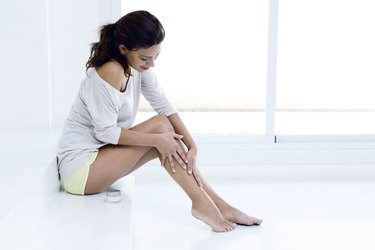
It's said that oil and water don't mix, but when it comes to understanding the differences between body lotion and body cream, the mixture of oil and water is the most important part. Each type of moisturizer had its own special composition and its own special set of benefits.
Significance
Video of the Day
Body cream and body lotion are both used to prevent dry, cracked skin and keep it supple and moisturized. Lotions and creams contain both an oily agent, or phase, and a watery agent. Both help replenish oil in the skin and protect against loss of moisture.
Video of the Day
Body Cream
Body cream is heavier and contains a higher viscosity, or sticky mixture of water and oil. According to SkinCarePhysician.com, creams penetrate the skin and provide a barrier that prevents more moisture loss from the skin than lotion. Creams, however, tend to feel greasier. A pharmaceutical or dermatology cream is usually an even mixture of 50 percent oil and 50 percent water. However, the ratio of water and oil in cosmetic cream and lotion varies and is also affected by other ingredients, such as paraffin. Because body cream is thicker, it is usually sold in a tub or jar container.
Lotion
Body lotions are not as sticky and are more readily absorbed by the skin because they have a lower viscosity than body creams. This form of moisturizer usually has a higher water content, comes in a bottle and can be poured out in a liquid form. Lotion is good for skin that is not excessively dry or when it is preferable not to have a sticky, greasy feeling on the skin.
Function
Use heavy or thick body creams on your hands, feet and legs where the skin tends to be dry. Heavy oil-based creams should not be used on your face unless you have excessive dryness.
Considerations
The Cleveland Clinic recommends using lighter coverage body lotions during the summer and heavier body creams during the winter when humidity is lower and moisture is depleted from the skin.
- Cosmetics and Toiletries: Research and Development
- CosmeticInfo.org: Skin Care Products
- ABC News Health: What's The Difference Between an Ointment, a Cream and a Lotion?
- Organic Consumers: FDA -- Cosmetic Ingredients
- SkinCarePhysicians.com: Doctor, Why Are You Prescribing an Ointment?
- ScienceDaily: Oil And Water Mix For Skin Care Treatment In Winter Season